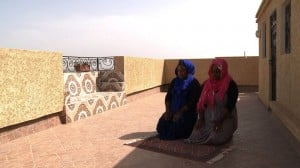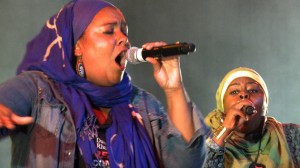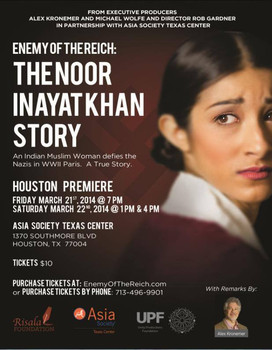Who comes to mind when hip hop and Islam are mentioned in the same sentence? Maybe hip hop and rap icons like Lupe Fiasco or Napoleon. The music genre and the religion have a long and intimate history; however, how many female artists come to mind?
In the U.K., a duo of women called Poetic Pilgrimage has been mixing their Jamaican culture, their politics and their Islam into the fabrics of England’s music scene. Made up of Sukina Abdul Noor and Muneera Rashida, the pair’s stories as two young women who converted to Islam and who utilize their musical talent drew the interest of Danish filmmaker Mette Reitzel.
In a documentary entitled “Hip Hop Hijabis,” Reitzal follows the two musicians for a period of three years, documenting their lives as black Muslim women musical artists and advancing women’s rights through their art.
I caught up with the director for an interview as the film is now in the phases of editing footage, and had the chance to talk to her about the documentary, what caught her attention about Poetic Pilgrimage and to share her thoughts concerning media representations of Muslim women (among other questions of course!) What follows is a transcription of the conversation that we had over Skype.
Sharrae: When did you first learn about Poetic Pilgrimage (Sukina and Muneera) and the work that they do? What brought you to them?
Mette: I think it must have been in the autumn of 2008 actually. I mean I was doing research on the Internet about female Muslim artists basically. I had a feeling that we weren’t getting quite the full story form the media. Originally it was a smaller project. I wanted to do a portrait of different artists from different disciplines and then I came across Poetic Pilgrimage. I just thought that their story was so interesting in itself that they deserved a whole project [laughs]. It needed a whole film to explain, because it’s a quite complex issue. And yeah, I just contacted them, and we met up and then they were kind of open about the idea from the very start. It all came along from there.
Sharrae: What specifically stood out to you about Sukina and Muneera and their work together?
Mette: In terms of a story for a film, I think the fact that they converted was very interesting, because it was an active choice to become Muslim and for a lot of people, that would seem like a strange choice, if all that you know about Muslims/Islam is what you hear from the media, as there is a lot of talk about Muslim women being oppressed and what have you. So the fact that they had actively chosen that seemed to be an obvious proof that there was something more to the story. So I thought that was interesting. And then, the fact that they are musicians and that their–you know for me, I didn’t know very much about hip hop. I’ve since learned that there is quite a big overlap between Islam and hip hop historically, but initially that seemed like a big contradiction. Then obviously this conflict of the discussion about whether music is haram or not–is kind of an interesting thing exploring in terms of a film. How do they deal with that, and how was that received when they converted? I thought it was interesting as well that they had explored other religions as well. They were searching and they had done a little research about different religions.
Sharrae: The fact that they chose Islam above the other ones is something that interested you?
Mette: Not so much about the fact that Islam was the one they eventually chose. But the fact that they were searching and they were open minded and exploring and I think that’s something a lot of people
Sharrae: What is your personal relationship with spirituality or religion or faith?
Mette: Well, uhm, I guess. It’s kind of a tricky question.
Sharrae: Sorry, I thought it was a natural question to better understand where you’re coming from – what’s your position and understanding?
Mette: Yeah, I mean I’m born and grew up in Denmark and like most people there, baptized and confirmed at the Protestant Church. Though technically I’d describe myself as agnostic. But I do think religion has an important role. Both in society now and in the history of our culture. I think that some feminists and some Western liberals are very strongly opposed to religion in general. And some of them have an almost fundamentalist attitude. You know, quite arrogant towards religious people, which I think is counter-productive. A part of my motivation is to question that and to try to contribute to a more nuanced discussion.

Sharrae: What was your familiarity with Islam before you met with Sukina and Muneera?
Mette: Not much really, that was one of the reasons for wanting to do the project. I’ve always been interested in religion. I studied Anthropology for a little while and though I didn’t complete my degree, I was still interested in those discussions. But I didn’t really know much about Islam in particular. So it was kind of an excuse to learn more basically. I just knew, what I read in the media basically.
Sharrae: I guess kind of thinking about media representation of Muslims and Muslims women, do you feel, as an artist and as an filmmaker, as a person who produces stories, and tells stories, in terms of paralleling the types of storytelling you do and the types of storytelling that mainstream media does, where do you find there is this incongruence?
Mette: I just think it’s important to remember these are very complex issues and in a newspaper article you can only express a very small aspect of it. Also the news media generally focus on things that are problematic, so I don’t know whether this issue is specific to the portrayal of Islam. We also mostly hear about Africa when there is a big famine or natural disaster, for example. The film is shot in an observational style. I’m not planning to put any voiceover of me commenting on what’s going on. If there is going to be any voiceover it’s going to be interviews with Sukina and Muneera. So as much as possible I’m trying to show the story from their perspective. Obviously, as director, I make certain decisions on how we film and how it’s edited and everything. But I suppose it’s going to be a combination of our stories in a way.
Sharrae: I like hearing that this documentary is trying to open up storytelling, and showcase the voices that are often neglected in mainstream circles.
Mette: It’s as much about opening things up and asking questions. I don’t feel like I have to come up with a conclusion, that there is a particular thing that I want everybody to think when they walk away. It’s just giving people a chance to explore it a bit more and see it from a different angle, basically.
Sharrae: So, how did you approach Sukina and Muneera?
Mette: How? You mean initially?
Sharrae: Yeah, and in terms of telling them about your project.

Sharrae: Have you experienced any resistance to this project? And if so from who?
Mette: There hasn’t been people asking “why are you telling this story” or whatever. But people are curious about Sukina and Muneera and their stories. But there definitely has been trouble getting access to certain events we would have liked to film and I can’t say exactly why that is. I suppose there is an understandable suspicion towards the media in general from within the Muslim community and people don’t necessarily see me as being different from ‘the media’ at large, even though this is a completely independent project.
Sharrae: What story do you want to share about Poetic Pilgrimage? I know you said its open-ended, you don’t want people to come to a certain conclusion. But during the past three years, what stories and themes have emerged?
Mette: I don’t really want to give away the story, the narrative of the actual film, you know. But I want people to be entertained I want people to be moved, but most of all, I want people to identify. So you know. I think that’s quite important. So the audience is going to learn certain specific things about the philosophy of Islam and history of Islam, but this is only interesting if they can identify with Sukina and Muneera as people, you know? And I think that, that’s very easy to do, because they’re so outgoing, they are just very likeable, they are very watchable….
I think what’s really interesting– you know the tagline for the film, which was very difficult to try to formulate in two sentences. It talks about their defending of women’s rights but it’s also about them finding their own voice along the way. I think that’s quite interesting for me. It’s like the interplay between the political and the personal. And, so they’re speaking out for people who are perceived to have less of a voice than they do, but in the process it’s also kind of empowering them as well. I think that’s quite interesting. I mean, in general, it’s very easy to kind of stand somewhere, and point fingers at what other people are doing, at what other cultures are doing, what are other groups are doing and what the system is doing wrong, what everyone is doing wrong basically. It’s usually easier to see what other people are doing wrong rather than what we are doing wrong ourselves and that’s a common human trait. It is important to point out those things, like what is going wrong in the world is important, to say that and to speak out for that. But I think the real power of that comes when you are able to reflect that back onto yourself and your personal life, and also within your own community. Because if you just stand there and yell about what everyone else is doing wrong, you’re only widening that gulf between you. It’s about acknowledging that maybe I’m also doing some of those things that I’m pointing out in other people is a beautiful and powerful realisation. That’s when true connection, empathy, humility, understanding start to develop. I think Sukina and Muneera do that in and interesting way. They do talk about what the politicians are doing wrong in the Middle East or what is the British government is doing wrong; they do talk about those things. But they are not afraid of talking about what’s wrong within the Muslim community or in the Black community, or what they’d like to improve within themselves as individuals, I think that’s quite an important point because that is where we have the most power to make a real difference. I think those two sides of things, the personal and political, they have to go together.
Sharrae: I think being able to be honest with our own flaws is so important, because some of the things, a lot of the time you are talking about oppression, or talking about the systems, but a lot of the times you know we are manifesting that in our own relationships, in our own organizing and work and the community doesn’t necessarily do that. If we are going to build a better society and if we are going to move forward, we need to look at ourselves first and be honest with ourselves.
Mette: Yes it happens everywhere. Even in the Occupy Movement, I heard stories that there were instances of both sexism and racism in the ways that they were organizing themselves. And that just goes to show how ingrained some of those things are in society and therefore in most of us as individuals, even when we are actively campaigning against it. It requires exceptional personal awareness to keep those things in check.
Sharrae: I guess more logistically, where are you at right now in the stage of production?
Mette: Well, we have lots of great footage and are in the process of transcribing a lot of it and getting an overview of logging and just basically getting ready to edit. We do want to do a little bit more filming, but not very much.
Yeah, that’s it. But, editing is a massive, massive job. And for now we are mostly focusing on fundraising, because we do need external support to get us through post-production. Until now it’s been fine. Me and the cinematographer have been freelancing and doing other jobs on the side. So we do one day filming here and a few days there. But for editing you need to be able to sit down for a good four months solid with two people and just focus on that until its finished. So we are running this crowd-funding campaign and we are applying for funding in other places as well. So hopefully within the next 4-6 months it will be finished, and then we are planning this sort of community program to go along with it as well, you know, workshops and talks and things. That’s sort of in the next stages at the moment. Just connecting the different people and organizations that we can collaborate with.
Sharrae: Without giving away what will be in the film, what is the most memorable moment for you so far?
Mette: Can I say two?
Sharrae: Sure!
Mette: I think I mentioned it before. The very first day we filmed it was that meeting about the Malcolm X tour, and it turned—it’s in the trailer, but the trailer doesn’t really show how emotional it was. Because it got extremely heated and a big discussion that was just incredible, because we weren’t expecting it, you know, we were just warming up getting ready to film. And then all of a sudden, like, this massive group discussion just exploded in front of us. That was interesting, and that issue of music being haram and women performing it hasn’t come up in such a direct way since that first day. It’s actually difficult for me to gauge how much of a problem it actually is. It’s like how many people actually think like that. That was interesting.
And kind of the opposite experience to that is when we were in Morocco, we went to this, it’s like a whole house that belonged to this group of Sufi women and they had a band as well, or a big group of musicians that performed quite a bit and there was this kind of, almost like, it wasn’t a public event, but it was sort– I don’t even know what to call it, I guess sort of…
Sharrae: Kind of what we would call here a jam session? [laughs]
Mette: [laughs] Like a jam session. Yeah and there was mostly women, and for them music is a big part of the relationship with the divine and there were some of the girls there that were dancing and were kind of getting into this quiet, like a trance basically. And that was really strange to watch and I think also for Sukina and Muneera, they are very inspired by Sufi philosophy, but that was a different type of relationship that they’re used to. It was new to them as well, but it was really interesting to see that as a counterpoint to this “music is haram” thing. For them it is actually a way of connecting with the God, or whatever you want to call it. That was quite interesting. But there have been many interesting moments.
Sharrae: I’m really excited to see this film when the editing process is finished! How central is hip hop to the film? And to the story? Do you feel like there is any redefinitions that are being created?
Mette: Redefinitions of hip hop or just in general? #00:35:27.6#
Sharrae: Definitions of identity, as in Sukina and Muneera, these ideas of defying what communities expect them to be as Muslim women and artists. And hip hop is very much about the ways that one lives through life. It is usually very politicized and is also very personal. So I guess in terms of hip hop in terms of an art form, which by default tries to redefine.
Mette: I don’t know if it’s so much about redefining. You know, they would be better at answering this question than I would be, you know [laughs]. But I don’t think it’s much about redefining it as much as it is about taking it back to the root, to where it came from, while also challenging some of the misogynist attitudes that are associated with it. How it developed. This sort of conscious movement in hip hop that came out of a political consciousness–It hasn’t been lost completely, but there is another hip hop that has stolen the limelight. So I think it’s more about a return to the roots of that than it’s about redefining it.
But I suppose, because hip hop originated in the States and now it has spread, and as far as I understand it, it seems like maybe in the UK and in the Middle East there is a big hip hop movement as well. So maybe in those places it is much closer to that political root than maybe it is in the States now.
Sharrae: I guess kind of wrapping out. There was great stuff that came out of this. I guess, through spending three years with them, what is it about Sukina and Muneera that inspires you?
Mette: I think the main thing about them really is that they’re really just, their just really themselves in a way, and very open about their background and their fears. I would find it difficult for me to be followed by a camera and to talk about myself in a way that they do. With the camera, I just find it, I don’t know that is quite…they’re just kind of themselves and people can judge them if they want. I don’t know, I suppose they do worry about what people think about them as most people do but they don’t let it stop what they’re saying.
Sharrae: Is there anything that you want to say. Any final words that the readers of Muslimah Media Watch want to take away from this interview, or how can they help support the project?
Mette: Well, apart from the obvious fact that we are sort of looking for donations obviously. But we would also like to build up connections with organizations and individuals about how we can use the film, and if someone is interested in screening it or collaborating on outreach activities, and to get in touch. But other than that, I don’t know. There might be something that might come into my head.
Sharrae: Their experiences as black women– does that come up in the film at all?
Mette: Yeah, it does. It does come. All the time, it comes up quite naturally. I suppose being of Jamaican origin it is a big part of who they are and it just comes up. I don’t know, it is impossible kind of like for me to make any statements of that [laughs]. But it does come up and they–I think they were concerned about before converting, whether there was a lot of racism in the Muslim community. I don’t know if Sukina and Muneera have directly said this, but I know some people think that the issue about hip hop in Islam is somehow connected to it coming from black culture. There is a growing, you know in the States there was a lot of black people converting in the 60s and 70s during the civil rights movement. As here, it’s happening now, it’s a more recent phenomenon.
Sharrae: Thank you so much, it was so wonderful speaking with you.
To learn more about the film or to donate funds or find out any way you can help out with the film, check Hip Hop Hijabis here: http://www.sponsume.com/project/hip-hop-hijabis.














